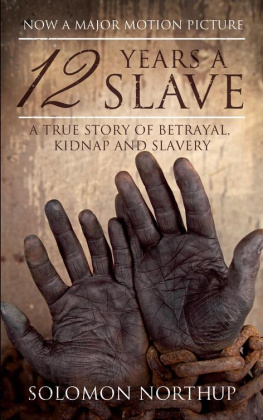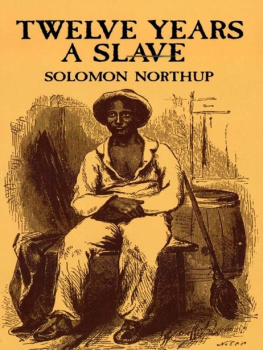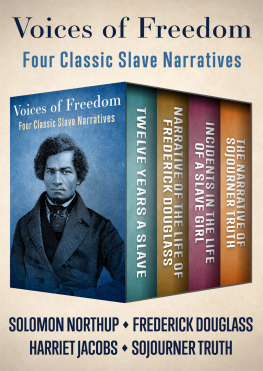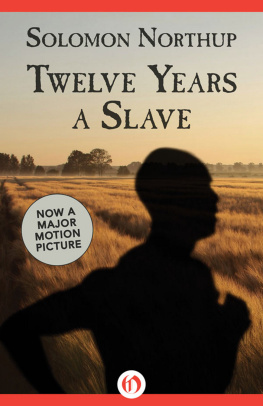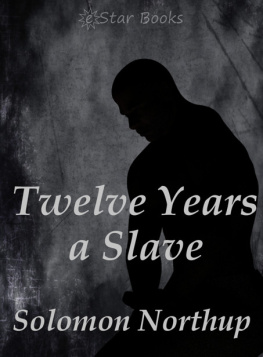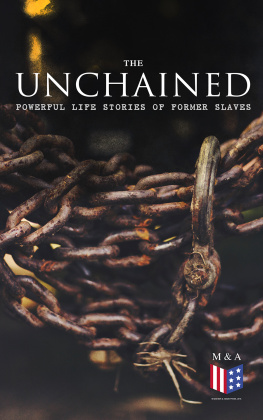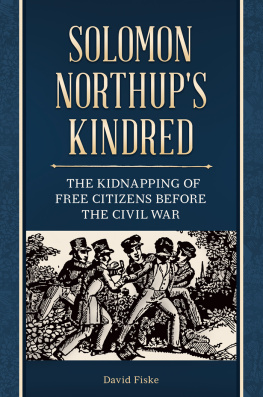When the editor commenced the preparation of the following narrative, he did not suppose it would reach the size of this volume. In order, however, to present all the facts which have been communicated to him, it has seemed necessary to extend it to its present length.
Many of the statements contained in the following pages are corroborated by abundant evidence others rest entirely upon Solomons assertion. That he has adhered strictly to the truth, the editor, at least, who has had an opportunity of detecting any contradiction or discrepancy in his statements, is well satisfied. He has invariably repeated the same story without deviating in the slightest particular, and has also carefully perused the manuscript, dictating an alteration wherever the most trivial inaccuracy has appeared.
It was Solomons fortune, during his captivity, to be owned by several masters. The treatment he received while at the Pine Woods shows that among slaveholders there are men of humanity as well as of cruelty. Some of them are spoken of with emotions of gratitude others in a spirit of bitterness. It is believed that the following account of his experience on Bayou Boeuf presents a correct picture of slavery, in all its lights and shadows, as it now exists in that locality. Unbiased, as he conceives, by any prepossessions or prejudices, the only object of the editor has been to give a faithful history of Solomon Northups life, as he received it from his lips.
In the accomplishment of that object, he trusts he has succeeded, notwithstanding the numerous faults of style and of expression it may be found to contain.
Having been born a freeman, and for more than thirty years enjoyed the blessings of liberty in a free State and having at the end of that time been kidnapped and sold into slavery, where I remained, until happily rescued in the month of January 1853, after a bondage of twelve years it has been suggested that an account of my life and fortunes would not be uninteresting to the public.
Since my return to liberty, I have not failed to perceive the increasing interest throughout the Northern States, in regard to the subject of slavery. Works of fiction, professing to portray its features in their more pleasing as well as more repugnant aspects, have been circulated to an extent unprecedented, and, as I understand, have created a fruitful topic of comment and discussion.
I can speak of slavery only so far as it came under my own observation only so far as I have known and experienced it in my own person. My object is, to give a candid and truthful statement of facts: to repeat the story of my life, without exaggeration, leaving it for others to determine, whether even the pages of fiction present a picture of more cruel wrong or a severer bondage.
As far back as I have been able to ascertain, my ancestors on the paternal side were slaves in Rhode Island. They belonged to a family by the name of Northup, one of whom, removing to the State of New York, settled at Hoosic, in Rensselaer County. He brought with him Mintus Northup, my father. On the death of this gentleman, which must have occurred some fifty years ago, my father became free, having been emancipated by a direction in his will.
Henry B. Northup, Esq., of Sandy Hill, a distinguished counselor at law, and the man to whom, under Providence, I am indebted for my present liberty, and my return to the society of my wife and children, is a relative of the family in which my forefathers were thus held to service, and from which they took the name I bear. To this fact may be attributed the persevering interest he has taken in my behalf.
Sometime after my fathers liberation, he removed to the town of Minerva, Essex, New York, where I was born, in the month of July 1808. How long he remained in the latter place I have not the means of definitely ascertaining. From thence he removed to Granville, Washington County, near a place known as Slyborough, where, for some years, he labored on the farm of Clark Northup, also a relative of his old master; from thence he removed to the Alden farm, at Moss Street, a short distance north of the village of Sandy Hill; and from thence to the farm now owned by Russel Pratt, situated on the road leading from Fort Edward to Argyle, where he continued to reside until his death, which took place on the 22nd day of November 1820. He left a widow and two children myself, and Joseph, an elder brother. The latter is still living in the county of Oswego, near the city of that name; my mother died during the period of my captivity.
Though born a slave, and laboring under the disadvantages to which my unfortunate race is subjected, my father was a man respected for his industry and integrity, as many now living, who well remember him, are ready to testify. His whole life was passed in the peaceful pursuits of agriculture, never seeking employment in those more menial positions, which seem to be especially allotted to the children of Africa. Besides giving us an education surpassing that ordinarily bestowed upon children in our condition, he acquired, by his diligence and economy, a sufficient property qualification to entitle him to the right of suffrage. He was accustomed to speak to us of his early life; and although at all times cherishing the warmest emotions of kindness, and even of affection towards the family, in whose house he had been a bondsman, he nevertheless comprehended the system of slavery, and dwelt with sorrow on the degradation of his race. He endeavored to imbue our minds with sentiments of morality, and to teach us to place our trust and confidence in Him who regards the humblest as well as the highest of his creatures. How often since that time has the recollection of his paternal counsels occurred to me, while lying in a slave hut in the distant and sickly regions of Louisiana, smarting with the undeserved wounds which an inhuman master had inflicted, and longing only for the grave which had covered him, to shield me also from the lash of the oppressor. In the churchyard at Sandy Hill, an humble stone marks the spot where he reposes, after having worthily performed the duties appertaining to the lowly sphere wherein God had appointed him to walk.
Up to this period I had been principally engaged with my father in the labors of the farm. The leisure hours allowed me were generally either employed over my books, or playing on the violin an amusement which was the ruling passion of my youth. It has also been the source of consolation since, affording pleasure to the simple beings with whom my lot was cast, and beguiling my own thoughts, for many hours, from the painful contemplation of my fate.
On Christmas Day 1829, I was married to Anne Hampton, a colored girl then living in the vicinity of our residence. The ceremony was performed at Fort Edward, by Timothy Eddy, Esq., a magistrate of that town, and still a prominent citizen of the place. She had resided a long time at Sandy Hill, with Mr Baird, proprietor of the Eagle Tavern, and also in the family of Revd. Alexander Proudfit, of Salem. This gentleman for many years had presided over the Presbyterian society at the latter place, and was widely distinguished for his learning and piety. Anne still holds in grateful remembrance the exceeding kindness and the excellent counsels of that good man. She is not able to determine the exact line of her descent, but the blood of three races mingles in her veins. It is difficult to tell whether the red, white or black predominates. The union of them all, however, in her origin, has given her a singular but pleasing expression , such as is rarely to be seen. Though somewhat resembling, yet she cannot properly be styled a quadroon, a class to which, I have omitted to mention, my mother belonged.

